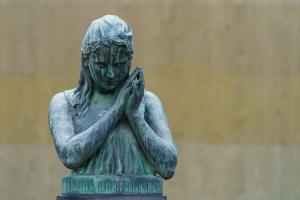
We are to rejoice in the Lord always. Even when we stumble and fall into some grievous sin, we should not despair. God loves us. We should not let sin make us feel hopeless, filling us with the grief of accidie. That grief, accidie, makes us slothful, for through it, we are tempted to believe that we cannot be saved, for when we believe that, we soon think it is useless to try to do anything good because it will not purify us from our sins. That grief, that sorrow, comes to us as we recognize our sins; it is an unholy sorrow, a distortion of the kind of grief which we should have over our sins. For truly, metanoia requires repentance, which includes an acknowledgement that we have done wrong. But the sorrow we feel over our sins should not lead us to despair. Rather, by the fact we understand that we have done wrong, we are shown we can recognize what is good and true and seek after it. When we do, then we will find that God’s love is so great that it can renew the virtues which we have lost thanks to our sins and lead us to our salvation. For Jesus, our high priest, willing expiates our sins for us, freeing us from the bondage of sin. “My little children, I am writing this to you so that you may not sin; but if any one does sin, we have an advocate with the Father, Jesus Christ the righteous; and he is the expiation for our sins, and not for ours only but also for the sins of the whole world” (1 Jn. 2:1-2 RSV). Through God’s mercy and grace, whenever we stumble and sin, we can receive the mercy and grace which we need to pick ourselves back up and follow after Jesus in the path of love.
Thus, there are two kinds of grief, one which is good and holy, and the other which is itself a sinful distortion of grief. Both have us recognize the fact we have done some wrong, but what is important is for us not to become trapped by grief, making us think there is no way to fix the harm which we have done through our sins. We can change our ways. We can do better. We can make things better. Likewise, then, there are two ways which we can feel grief when we see others stumble and fall in sin. We can either use it as an opportunity to show our love to them, not condemning them for what they have done, giving them whatever comfort they need, which is a holy engagement with such grief, or we can end up distorting that grief and turning it into a kind of despair where we judge and condemn our neighbor. Such judgment does not lie with us, but with God.
Thus, grief is important, but we must understand there are two kinds, one which is useful, and one which is not:
She also said, ‘There is grief that is useful, and there is grief that is destructive. The first sort consists in weeping over one’s own faults and weeping over the weakness of one’s neighbours, in order not to destroy one’s purpose, and attach oneself to the perfect good. But there is also a grief that comes from the enemy, fully of mockery, which some call accidie. This spirit must be cast out, mainly by prayer and psalmody.’[1]
Amma Syncletica tells us that when we feel like giving up, no longer pursuing the path of holiness, because we feel hopeless, we should fight back with prayer and psalmody. That is, we should resist the temptation to turn away from God in despair by going directly to God in prayer. The more we turn to prayer, the more we will realize how foolish it is for us to think God will turn away from us and leave us in our sins. However, psalmody, singing the psalms and other songs which liven the spirit and remind us of the great bounty of God’s love and grace, also will help us, because through such songs, we will establish in our minds those pattens of thought which we need to fight any temptation towards accidie. The more we focus on hope, the more we open ourselves up to joy, the less room we will have in us for such unwholesome despair. It is important for us to focus on such songs, because music touches us in ways other forms of spiritual engagement does not. It stirs the soul. We can experience much through music which we cannot by mere thought alone. Likewise, through music, we can share in the experiences of others, the joys and sorrows they have gone through, so that through their joy, we can once again experience some joy, and once we do so, hopefully our own joy will be rekindled so that through it, we will be able to overcome any and all unholy grief.
Grief, when it is sorrow for failure with a desire and will to do better, can do us good, but when we focus on that grief and look only at our past failures, so we do not move on, our attachment to that grief leads us to despair. Grief, when properly engaged, will help us be humble so that we recognize we need God’s help instead of thinking we can do all things by ourselves. Our sorrow should be the sorrow of a lover who has failed their beloved who nonetheless realizes their beloved still loves them, so that they do not despair of losing that love but rather become motivated to honor that love by trying not to fail their beloved again. Our grief over sin should motivate us to love more, to act on that love, noting that the love of God is there, ready to receive us no matter what we have done. If we allow it to do this, then we will not wallow away in sorrow and find ourselves trapped by our grief. God is love. Nothing we do can take God’s love away from God, and so, nothing we can do can take away God’s love from us. Once we realize that God’s love is still there for us, then we will recognize there is no reason to despair, and we can then truly repent, pick ourselves back up, and follow God in the path of holiness which is not other than the path of love.
[1] The Sayings of the Desert Fathers. trans. Benedicta Ward (Kalamazoo, MI: Cistercian Publications, 1984), 235 [Syncletica Saying 27].
Stay in touch! Like A Little Bit of Nothing on Facebook.
If you liked what you read, please consider sharing it with your friends and family!












